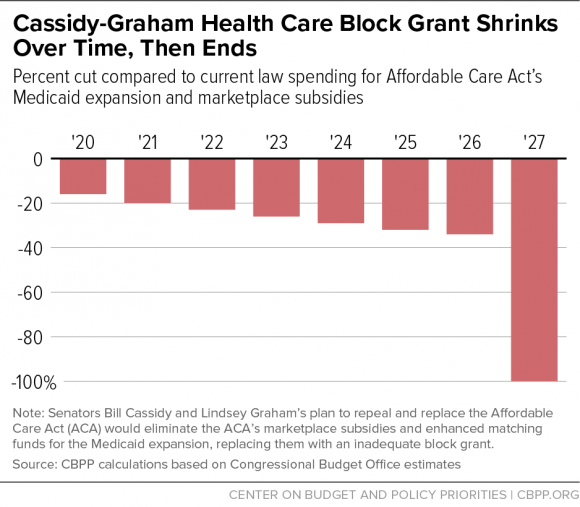~The GOP Repeal Bill Would Cut Coverage, Raise Costs and Eliminate Protections~
With 3 weeks until the clock runs out on the GOP’s ability to repeal health care through partisan repeal, Republicans are scheming to ram through another secretly drafted plan — but this one might be their worst one yet. Senators have repeatedly promised an open process with “regular order” to allow for expert testimony, debate and amendments before passing a health care repeal, but this scheme was drafted in secret and may be rammed through at the last minute. In fact, Ohio Republican Governor John Kasich said last week that he opposes this plan, calling it an “eleventh hour” attempt at repeal, and in a bipartisan Senate hearing Massachusetts Republican Governor Charlie Baker said the plan would result in “dramatically negative” effects in his state.
Reports about the plan, known as Graham-Cassidy-Heller, suggest that it will include the same draconian cuts to Medicaid as the Senate’s previously introduced Better Care Reconciliation Act by eliminating the enhanced federal funding for the ACA’s Medicaid expansion and turning the remaining program into a block grant. But Graham-Cassidy-Heller would also eliminate the ACA’s marketplace subsidies. In their place, the proposal would give states a block grant that would shrink over time, ending entirely by 2027.
Source: Center on Budget and Policy Priorities, 8/24/17
The nonpartisan Congressional Budget Office has shown that every health care repeal means cutting coverage, increasing costs and gutting protections that people depend on. This is no different. In fact, Maine Republican Senator Susan Collins said she has “a lot of problems” with the way this plan guts Medicaid, and Nevada Republican Governor Brian Sandoval said he has “a problem” with the cuts to health insurance in Nevada.
“Anyone who thinks Republicans have been listening to voters who hated the first 5 health care repeal attempts is sorely mistaken — this latest scheme is even worse,” said Protect Our Care Campaign Director Brad Woodhouse. “Republicans are putting politics over people’s health care and are rushing through this partisan, harmful repeal bill in the final 3 weeks. Doing this puts in jeopardy the bipartisan, open process that’s begun in Senate Health Committee to strengthen our health care system.”
The American people have overwhelmingly rejected health care repeal time and again. In the latest polling from Hart Research released last week, voters have gone from neutral on health care repeal in March of 2017 (45% favor, 48% unfavor) to overwhelmingly opposed in the latest polling (25% favor, 60% unfavor). In fact, an analysis by MIT found the GOP effort to repeal health care to be the most unpopular legislation in 30 years.
KEY FACTS ABOUT GRAHAM-CASSIDY-HELLER
- Includes the same cuts to Medicaid And Medicaid Expansion As Other Repeal Bills. This repeal scheme embrace the already-rejected Medicaid cuts in the Senate’s failed health care repeal bill (known as BCRA) with $180 billion in cuts over 10 years — gutting Medicaid coverage for seniors in nursing homes and kids with disabilities. In addition, this would effectively eliminate Medicaid expansion by 2027. [Center on Budget and Policy Priorities, 8/24/17]
- Increases Out Of Pocket Costs And Weakens Protections For People With Pre-existing Conditions. As the Center on Budget and Policy Priorities found, “The proposal includes provisions of the Senate Republican leadership bill that would allow states to waive important consumer protections in the individual market. Under these waivers, which would be subject to near-automatic approval by the federal government, insurers could exclude crucial services such as maternity and mental health care from their plans, impose annual and lifetime limits, and dramatically raise deductibles and other out-of-pocket costs. According to CBO, states with about half of the population would take up these damaging waivers. In addition, Senators Cassidy and Graham are reportedly also considering adding to their plan the so-called ‘Cruz amendment,’ which would allow insurers to charge sharply higher premiums to people with pre-existing conditions or deny them coverage altogether.” [Center on Budget and Policy Priorities, 8/24/17]
- Allows Insurers To Charge Older People Up To Five Times More For Coverage As Younger People. [Kaiser Family Foundation, 8/1/17]
- Reduces And Eventually Eliminates Federal Funding For Tax Credits That Help People Afford Coverage. “Under current law, moderate-income individual market consumers are guaranteed tax credits to help them pay for meaningful coverage meeting certain standards, and low-income adults in expansion states are guaranteed the ability to enroll in Medicaid, which ensures a comprehensive array of benefits and financial protection. The Cassidy-Graham amendment would eliminate these guarantees and allow states to spend their federal funding on virtually any health care purpose. Faced with large federal funding cuts and exposed to enormous risk, most if not all states would be forced to use this ‘flexibility’ to eliminate or cut coverage and financial assistance for low- and moderate-income people.” [Center on Budget And Policy Priorities, 7/27/17]


